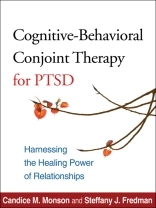Presenting an evidence-based treatment for couples in which one or both partners suffer from posttraumatic stress disorder (PTSD), this step-by-step manual is packed with practical clinical guidance and tools. The therapy is carefully structured to address both PTSD symptoms and associated relationship difficulties in a time-limited framework. It is grounded in cutting-edge knowledge about interpersonal aspects of trauma and its treatment. Detailed session outlines and therapist scripts facilitate the entire process of assessment, case conceptualization, and intervention. In a large-size format for easy photocopying, the book includes 50 reproducible handouts and forms.
Cuprins
I. Background and Overview of CBCT for PTSD1. An Introduction to Cognitive-Behavioral Conjoint Therapy for PTSD2. Initial Assessment, Case Conceptualization, and Working with Complex Cases II. CBCT for PTSD Treatment Manual Phase 1. Rationale for Treatment and Education about PTSD and Relationships Session 1. Introduction to Treatment Session 2. Safety Building Phase 2. Satisfaction Enhancement and Undermining Avoidance Session 3. Listening and Approaching Session 4. Sharing Thoughts and Feelings: Emphasis on Feelings Session 5. Sharing Thoughts and Feelings: Emphasis on Thoughts Session 6. Getting U.N.S.T.U.C.K.Session 7. Problem Solving to Shrink PTSDPhase 3. Making Meaning of the Trauma(s) and End of Therapy Session 8. Acceptance Session 9. Blame Session10. Trust Session 11. Control Session 12. Emotional Closeness Session 13. Physical Closeness Session 14. Posttraumatic Growth Session 15. Review and Reinforcement of Treatment Gains
Despre autor
Candice M. Monson, Ph D, is Professor of Psychology and Director of Clinical Training at Ryerson University in Toronto. She is also an Affiliate of the Women’s Health Sciences Division of the U.S. Department of Veterans Affairs National Center for PTSD, where she previously served as Deputy Director. Dr. Monson’s research focuses on intimate relationships and traumatic stress and the use of conjoint therapy to treat posttraumatic stress disorder (PTSD). She has published extensively on the development, evaluation, and dissemination of PTSD treatments more generally, as well as gender differences in violence perpetration and victimization. Steffany J. Fredman, Ph D, is Assistant Professor of Human Development and Family Studies at the Pennsylvania State University. Dr. Fredman is a recipient of the Martin S. Wallach Award for Outstanding Doctoral Candidate in Clinical Psychology from the University of North Carolina at Chapel Hill. Her clinical and research interests focus on the interpersonal context of individual psychopathology, with an emphasis on PTSD. Together, Drs. Monson and Fredman are the codevelopers of cognitive-behavioral conjoint therapy for PTSD.












